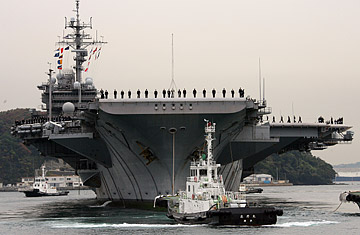
Aircraft carrier USS Kitty Hawk
One of the most striking aspects of China's emergence as a world power has been the sophistication with which the nation's complex and evolving new role on the global stage has been managed. A country that once was known for stonefaced spokesmen spouting slogans has displayed a remarkable finesse in forging new relationships and revivifying old ones. In the last five years, for example, President Hu Jintao has led a concerted effort to spread China's so-called "soft power" in Asia, Africa and South America. There have also been sharp reversals of what previously seemed intractable positions on key regional issues such as reining in North Korea's nuclear program, where many observers credit pressure from China on their North Korean allies as being critical to the effort's progress. Long-strained relations with Japan have also improved markedly; over the weekend, the two counties held their highest-level summit in Beijing since diplomatic ties were restored in 1972.
Yet despite all its newfound diplomatic adroitness, on a few sensitive issues the Beijing government seems to revert instinctively to its Maoist-era default mode. Last week China gave the world a series of demonstrations of that, in relation to two especially sensitive issues, Taiwan and the Dalai Lama.
The problem first emerged when news broke of China's refusal to allow the USS Kitty Hawk aircraft carrier to make a long-planned port visit to Hong Kong for the American Thanksgiving holiday. The abrupt decision produced plenty of heart-wrenching news photos of tearful U.S. Navy family members who had flown into Hong Kong to meet their loved ones. Apparently in reaction to the negative coverage, the Foreign Ministry then announced it had changed its mind for "humanitarian reasons" and would allow the carrier to visit after all, though by this time the ship was already well on its way to its home base in Japan. Similar confusion seemed to be in evidence a few days later when, during a visit to the White House, Chinese Foreign Minister Yang Jiechi reportedly told President Bush the episode was due to a "misunderstanding." But the next day, ministry spokesman in Beijing Liu Jianchao, told reporters that reports Yang had used the word "misunderstanding" didn't "conform with the facts."
Some 50 U.S. navy vessels pass through Hong Kong in a normal year and the only time entry has been refused before was during crises such as the bombing by American planes of the Chinese Embassy in Belgrade in 1999 and the mid-air collision of a Chinese fighter and a U.S. surveillance plane in 2001. So in diplomatic terms, the Kitty Hawk refusal was a pretty sharp rebuke. It was also a much more calculated move than it at first appeared: The Pentagon revealed in the days after the incident that two other ships and a U.S. Air Force plane had earlier been denied stopovers in Hong Kong. Comments by Foreign Ministry spokesman Liu made it clear that there was a linkage between the refusals and the Washington visit earlier in November by the Dalai Lama, Tibet's exiled spiritual leader, as well as to the recently announced sale of a batch of sophisticated arms to Taiwan.
Beijing may have thought it was making a clear diplomatic demarche. But the flip-flopping over the Kitty Hawk made China seem both vindictive and indecisive. It led a lot of observers to wonder what would happen if there was a real crisis in the Taiwan Strait, where there is always the potential for a disastrous "misunderstanding." It also highlighted a lack of communication within the Chinese government that makes the possibility of a military confrontation in the Strait even more worrying.
One problem, says Huang Jing, a Senior Fellow in Foreign Policy Studies at the Brookings Institute in Washington D.C., is that China's Foreign Ministry has relatively little power and largely acts as a messenger to convey policies crafted at higher levels, such as the military. "Everyone seems to think that Yang Jiechi is China's Condi Rice," says Huang, "but he's actually quite low on the totem pole compared with a senior general, to whom he would have to bow and be deferential." Of course, many bureaucracies suffer from communications problems, blurred lines of authority and plain old dumb decisions. But because of its burgeoning importance in helping to manage world affairs, China now has a responsibility to set its house in order. With 900 missiles aimed at Taiwan on China's coast and U.S. carrier battle groups sailing through the Taiwan Strait, there's ample opportunity for miscalculation. And if shooting started because some general didn't want to pander to a lowly member of the striped-pants set, that wouldn't just be dumb. It would be a disaster.
